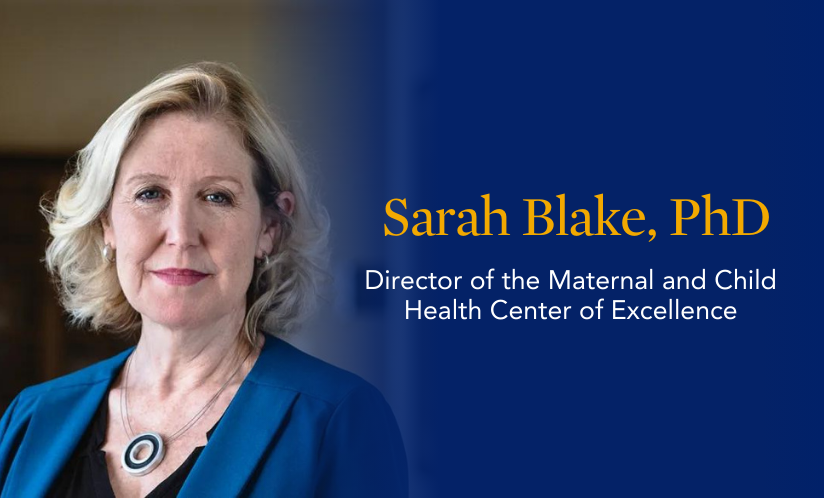Five Questions with Maternal Health Researcher Sarah Blake

By Ellie Pourbohloul
Sarah Blake, PhD, associate professor of health policy and management and director of Emory University Maternal and Child Health Center of Excellence, discusses maternal health concerns impacting Americans right now.
Can you describe your research on maternal health disparities?
There are stark differences and inequalities in the quality of care and access to care women have in Georgia and in the United States. This is especially true for women of color, low-income women, uninsured women, and those living in rural areas. I focus on these populations and strive to reduce disparities by improving access to care.
One of these projects is evaluating Georgia’s Medicaid family planning waiver. This waiver provides uninsured and low-income women in Georgia access to Medicaid for family planning between pregnancies. We work with Georgia’s Medicaid program on this project and have been able to show improvements in accessing family planning—specifically for long-acting reversible contraception and reductions in repeat pregnancies within 18 months.
I’m also working on a project called the Abundant Birth Project which will test an economic and health intervention thatfinancially empowers mothers by offering a $1,000 monthly stipend to 25 Black pregnant women in Atlanta. This simple yet innovative economic pilot project seeks to achieve better maternal health and birthing outcomes, reduce poverty, and build economic security for women and their families.
What role do social and community factors play in maternal morbidity and mortality? How can we address these issues on a larger scale?
Where someone lives and where they’ve grown up—as well as their community, economic status, and education—are all factors that can and do shape health.
We know from the work we have done that social and community factors help explain in part why certain populations (women of color, low-income women in particular) are at greater risk for negative birth outcomes, like maternal deaths. Housing instability, a lack of transportation, and a lack of social support can all help explain these inequalities in maternal health.
You've worked closely with both the CDC and Georgia Department of Public Health. What are some of the key insights or solutions that have come from these collaborations?
A big part of what I do is offer technical assistance to our local and national public health agencies. As a researcher and evaluator, I help these agencies know whether their programs are working as planned and what can be done to create equitable and effective solutions to improve women’s health, with a focus on maternal and child health.
With the CDC, we provided technical assistance to help maternal mortality review committees throughout the United States understand how to work with maternal mortality data to understand and identify prevention strategies for future deaths.
For the Georgia Department of Public Health, I help prepare their Title V needs assessment. Title V is the most important state funding of maternal and child health programs, including for children with special health care needs. We lend our expertise with data to identify and analyze national performance measures on specific priorities set by the state.
We also work with maternal and child health partners across the state to help guide the Georgia Department of Public Health to set their priorities for the next Title V five-year grant cycle. We also work with the Georgia Department of Community Health to help evaluate the Medicaid family planning waiver.
As a health equity researcher, how do you ensure that the voices of underserved communities are included in your work?
It is essential that the voices of those with lived experiences and from the communities be part of the work we do. We believe they should be mostly driving this work, setting out the agenda for how and what to do. Otherwise, we may not have the intended impact, creating solutions that are not evidence-based and community oriented.
As a health services researcher, I partner with community-based organizations who work closely with their communities and represent women in need of voice and representation.
What changes do you hope to see in maternal health policy, and how can individuals and organizations help drive those changes?
There are so many changes I want to see in maternal health policy, but most immediately I’d like to keep our state and national investments in Medicaid funding. About 40% of all births are covered by Medicaid, so any threats to funding will undoubtedly lead to adverse outcomes for moms and their infants. This can also hurt the progress 48 states have made so far in expanding Medicaid to 1 year postpartum.
I would also like to see improvements in screening for and treating perinatal mental health. In Georgia (as well as the United States), mental health has consistently been a leading cause of maternal death. However, we do not have systems in place to properly screen and refer women to treatment. We also do not have enough perinatal mental health providers, causing challenges in access to care. These are gaps that my team is actively working to address.


